To improve post-workout hydration, start by understanding your hydration needs; aim to drink 16-24 ounces of water for every pound lost during exercise. Choose the right fluids—water is ideal, but coconut water and low-sugar sports drinks work well too. Don't forget electrolyte replenishment; foods rich in sodium, potassium, calcium, and magnesium are key. Time your hydration by sipping fluids during cool-downs, and monitor your urine color as a hydration gauge. Finally, listen to your body's signals. If you follow these tips, you'll set yourself up for a great recovery and peak performance in your next session.
Core Insights
- Drink 16-24 ounces of water for every pound lost during exercise to effectively replenish fluids.
- Include electrolyte-rich foods and drinks like coconut water or low-sugar sports drinks for optimal recovery.
- Monitor urine color; clear or light yellow indicates good hydration, while dark yellow or amber suggests the need for more fluids.
- Hydrate during your cool-down to maximize fluid absorption and recovery efficiency post-workout.
- Space out fluid intake over several hours to ensure proper hydration levels are maintained throughout the day.
Understand Your Hydration Needs
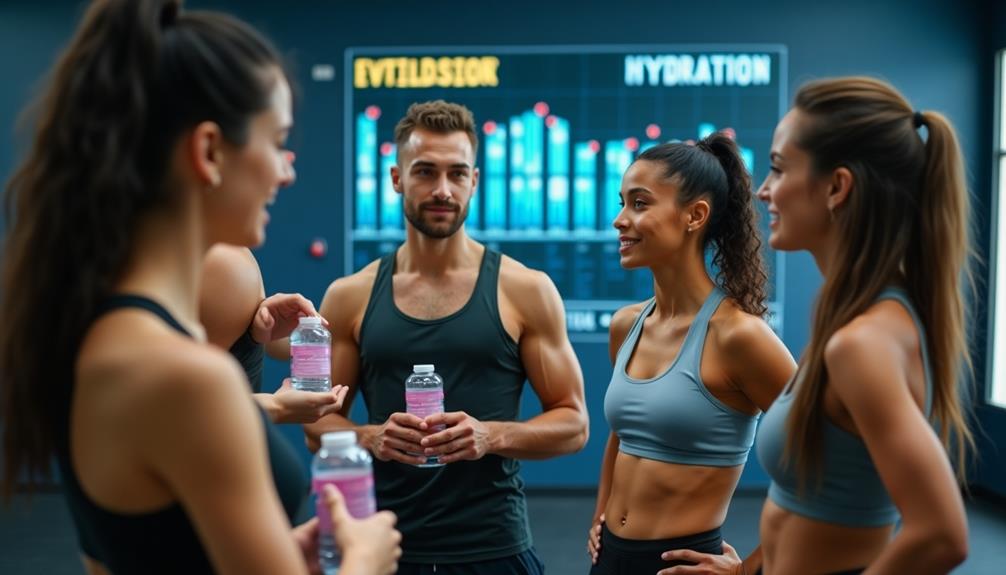
Understanding your hydration needs is important for optimal recovery after a workout. When you exercise, your body loses fluids through sweat, and replenishing those fluids is essential. Start by determining how much you've lost. A good rule of thumb is to drink about 16-24 ounces of water for every pound lost during your workout. Listen to your body; if you feel thirsty, drink. It's also helpful to monitor the color of your urine; pale yellow indicates proper hydration. Remember, hydration isn't just about water. Some people may benefit from cognitive assistance supplements that include ingredients like DHA and Bacopa Monnieri to enhance mental clarity during workouts. These supplements can complement your hydration routine for overall wellness. Factors like your workout intensity, duration, and individual sweat rate play a role. By recognizing these elements, you'll guarantee your body recovers effectively, helping you feel refreshed and ready for your next session.
Choose the Right Fluids
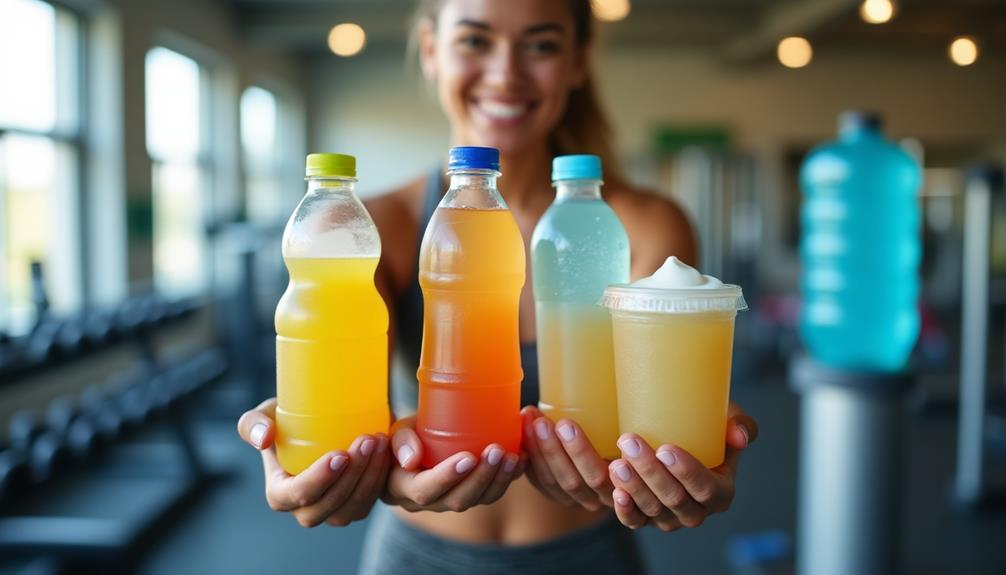
Here's a quick reference table to guide your fluid choices:
| Fluid Type | Benefits |
|---|---|
| Water | Rehydrates without calories |
| Coconut Water | Natural electrolytes |
| Low-Sugar Sports Drink | Quick hydration boost |
| Herbal Teas | Hydrating and soothing |
Replenish Electrolytes
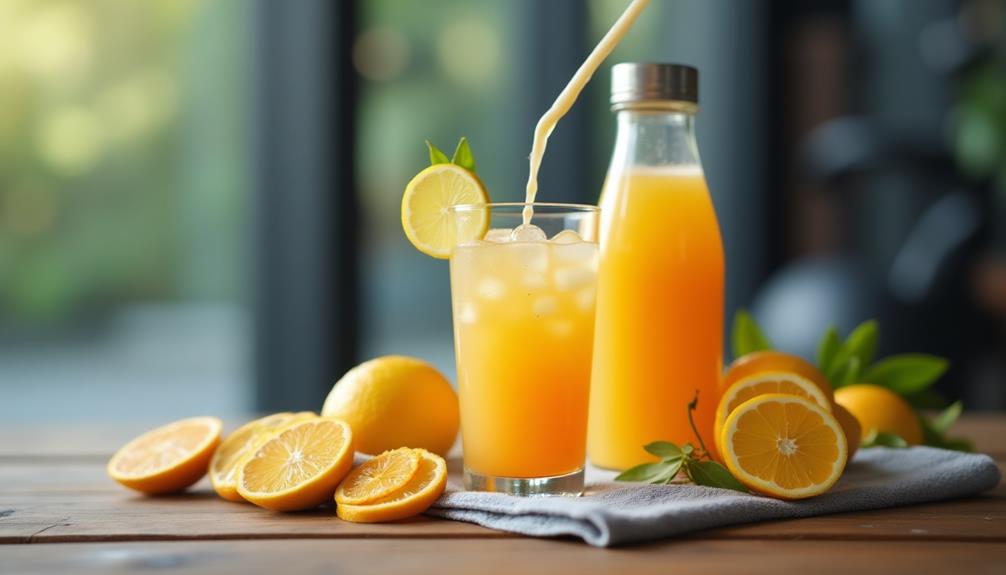
After you finish a workout, it's crucial to replace the electrolytes you've lost through sweat. Electrolytes play an important role in maintaining your body's fluid balance, muscle function, and overall performance. Here are some key electrolytes you should consider replenishing:
- Sodium: Helps retain water and maintain blood pressure.
- Potassium: Supports muscle contractions and nerve function.
- Calcium: Essential for muscle movement and bone health.
- Magnesium: Aids in muscle recovery and reduces cramps.
To effectively replenish these essential minerals, consider consuming sports drinks, coconut water, or electrolyte tablets. You can also include electrolyte-rich foods like bananas, spinach, or yogurt in your post-workout meals. Doing so will help you recover faster and stay hydrated.
Time Your Hydration
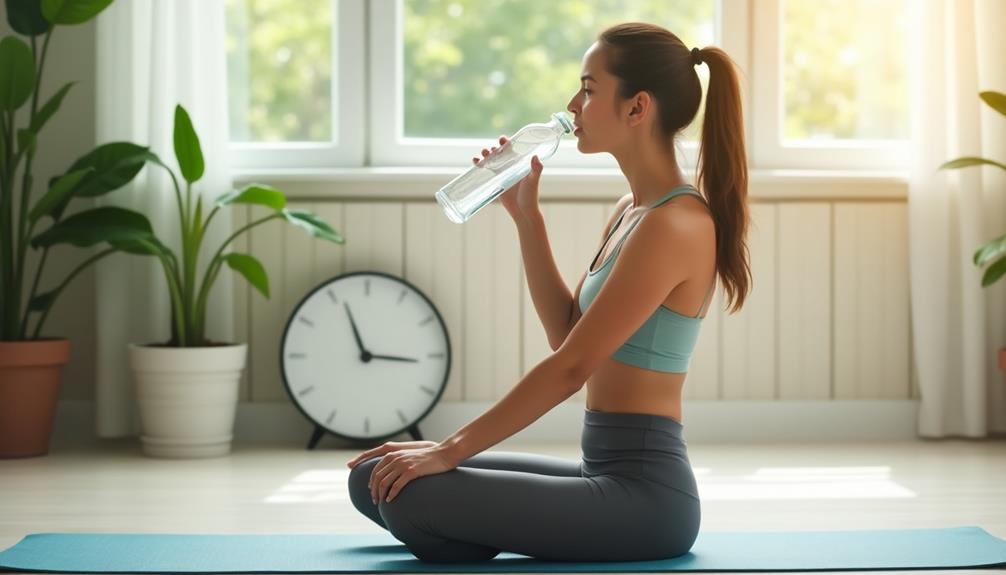
Think about sipping on water or a sports drink throughout your cool-down period. If you wait too long to hydrate, your body might struggle to replace what it lost during exercise. For best performance, you might want to explore using top hydration powders that are specifically designed to replenish electrolytes and support recovery.
Moreover, spacing out your fluid intake over the next few hours can guarantee ideal absorption. Instead of chugging a large amount at once, drink smaller amounts regularly. This approach keeps your hydration levels steady and supports overall recovery. Remember, consistent hydration after your workout sets the stage for your next training session.
Monitor Your Urine Color
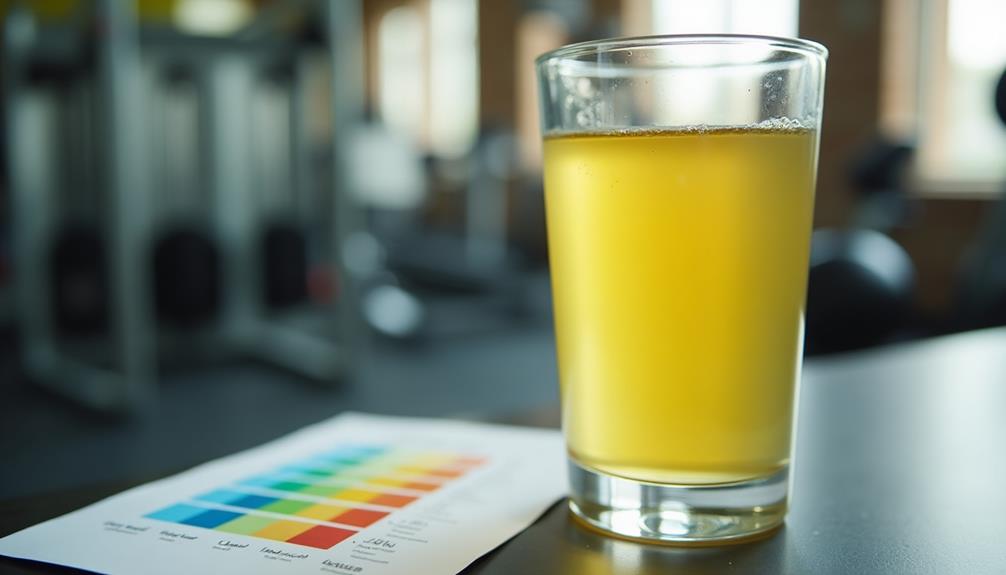
Monitoring your urine color is a simple yet effective way to gauge your hydration levels post-workout. By keeping an eye on this essential sign, you can make sure you're replenishing fluids adequately. For best hydration, consider incorporating electrolyte-rich coconut water into your post-workout routine, as it can help replenish essential minerals lost during exercise. Here's what to look for:
- Clear to Light Yellow: You're well-hydrated.
- Dark Yellow: You need to drink more fluids.
- Amber or Honey: You're likely dehydrated; drink up!
- Brown: Seek medical attention, as this may indicate severe dehydration.
Regularly checking your urine color helps you adjust your hydration strategy. If you notice a change, take action by consuming water or electrolyte drinks. Staying aware of your body's signals can enhance your recovery and overall performance.
Incorporate Hydrating Foods
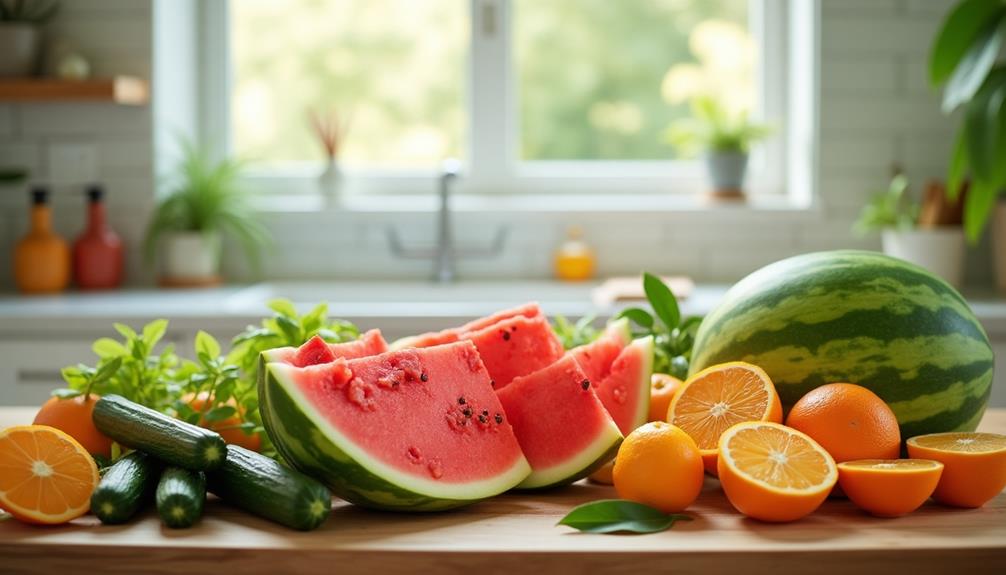
Including hydrating foods in your post-workout meal can greatly enhance your recovery. These foods not only replenish lost fluids but also provide essential nutrients to support muscle repair.
Start with fruits like watermelon, oranges, and strawberries. They're high in water content and packed with vitamins. Vegetables such as cucumbers, celery, and lettuce are also great choices. They help maintain hydration and add fiber to your diet.
Consider adding soups or smoothies, which can be both hydrating and nourishing. For example, a smoothie made with yogurt, spinach, and bananas combines hydration with protein and carbohydrates.
Use a Hydration Tracker
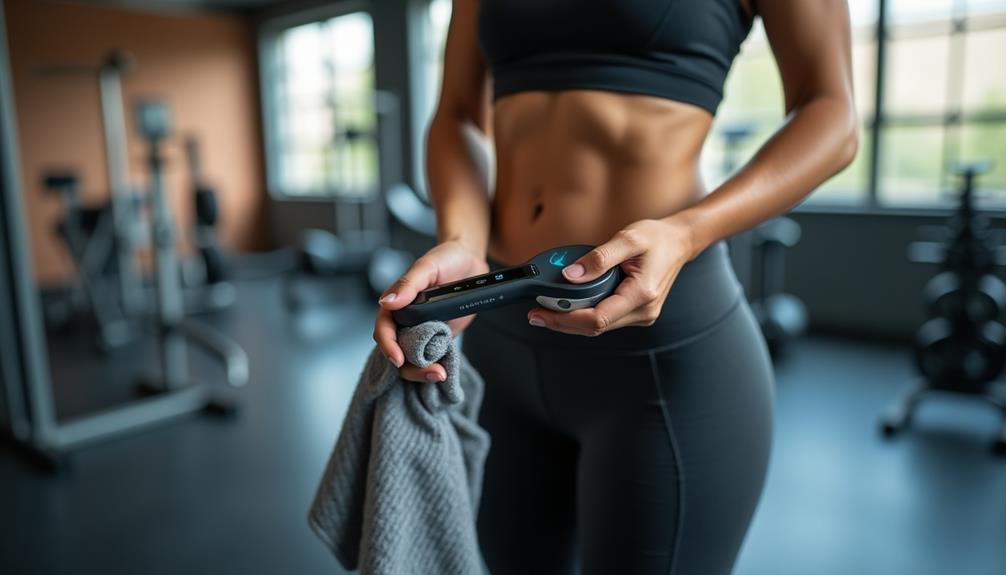
As you push your body during workouts, keeping track of your hydration levels becomes essential for optimal recovery. Using a hydration tracker can help you monitor your fluid intake and confirm you're replenishing lost fluids effectively. Here are some benefits of using a hydration tracker:
- Real-time feedback: Get instant insights into your hydration status.
- Personalized goals: Set and adjust your daily hydration targets based on your activity level.
- Accountability: Stay committed to your hydration routine with reminders.
- Data analysis: Review trends over time to see how hydration impacts your performance.
Avoid Overhydration

When it comes to post-workout hydration, finding the right balance is crucial; overhydration can be just as harmful as dehydration. Drinking too much water can lead to a condition called hyponatremia, where sodium levels in your blood drop too low. This can cause symptoms like headache, confusion, and in severe cases, seizures.
To avoid overhydration, listen to your body. Thirst is a natural indicator of when you need water. Rather than gulping down large amounts, sip gradually throughout the day. Pay attention to your urine color; pale yellow typically indicates good hydration. If it's clear, you might be drinking too much. Keep these tips in mind to make sure your hydration supports your recovery without going overboard.
Consider Temperature Effects
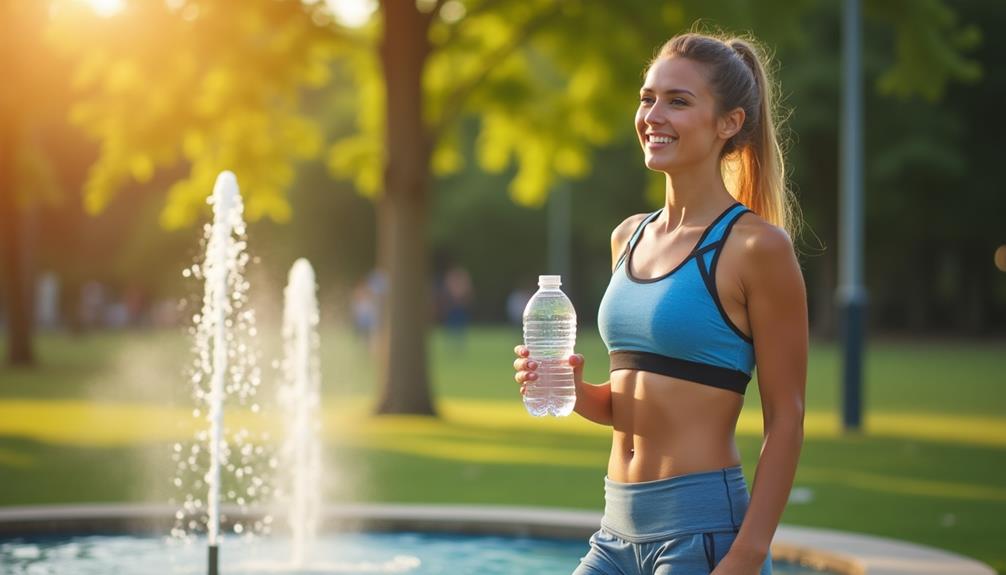
Temperature plays a significant role in your post-workout hydration strategy. When you exercise, your body heats up, and this can impact how you rehydrate afterward. You should consider both the environmental and beverage temperatures for best recovery.
- Chilled drinks can help lower your body temperature.
- Mildly warm beverages may aid in digestion and absorption.
- Hydration needs increase in hotter temperatures.
- Cold drinks can be invigorating but might cause stomach cramps for some.
Listen to Your Body

Listening to your body is essential for effective post-workout hydration. Your body's signals can guide you in replenishing fluids accurately. When you finish exercising, pay attention to how you feel. Thirst, fatigue, or dry mouth are signs that you need to hydrate. Additionally, monitoring the color of your urine can provide insights into your hydration status.
| Signal | Action Needed |
|---|---|
| Thirst | Drink water or a sports drink |
| Fatigue | Increase fluid intake |
| Dry Mouth | Hydrate immediately |
| Dark Urine | Replenish fluids quickly |
Frequently Asked Questions
How Much Water Should I Drink Before a Workout?
You should drink about 16 to 20 ounces of water at least 1-2 hours before your workout. This helps hydrate your body, improving performance and preventing dehydration during your exercise session. Stay prepared!
Can I Hydrate Effectively With Coffee or Tea?
Picture sipping a warm cup of coffee or tea after a workout. While they can hydrate, they're not as effective as water. Stick to water for best hydration, and enjoy your brew later.
Are Sports Drinks Necessary for Light Workouts?
Sports drinks aren't necessary for light workouts. Water usually suffices for hydration. If you're exercising intensely or for extended periods, consider sports drinks for electrolytes, but they're typically not needed for shorter sessions.
What Symptoms Indicate Dehydration During Exercise?
If you're feeling like a zombie during your workout, it might be dehydration. Look out for signs like dizziness, dry mouth, fatigue, or dark urine. Stay sharp and drink water to keep your energy up!
How Do Altitude and Humidity Affect Hydration Needs?
Altitude can increase your hydration needs due to lower oxygen levels, while humidity causes you to sweat more. You'll need to drink more fluids to stay properly hydrated in both conditions, so adjust accordingly.

